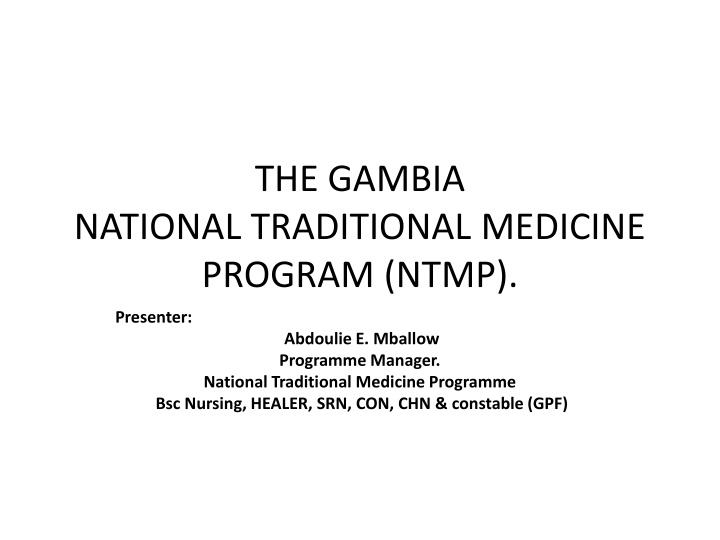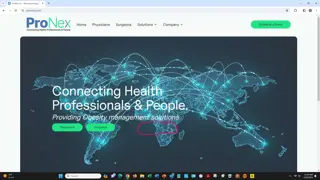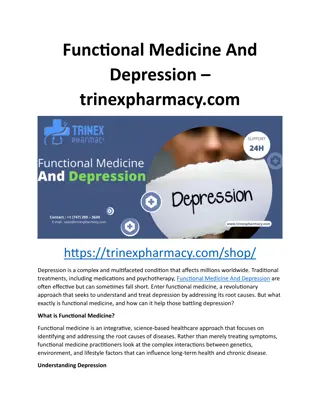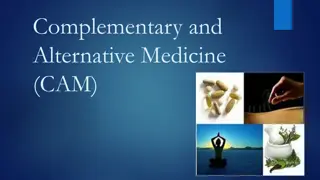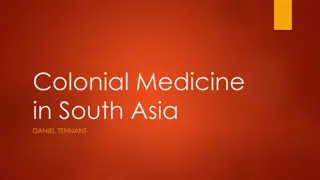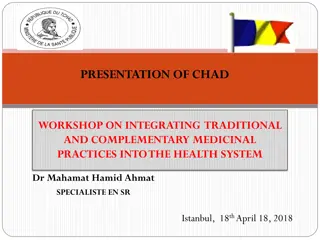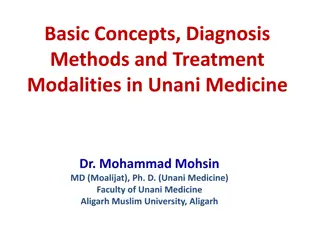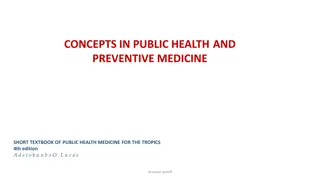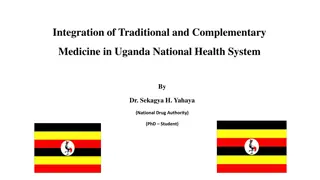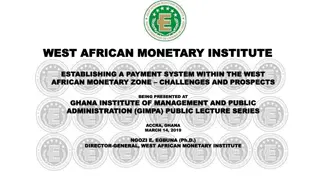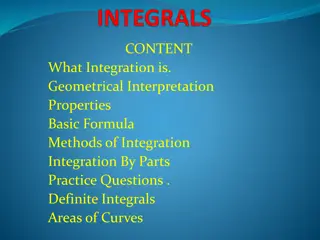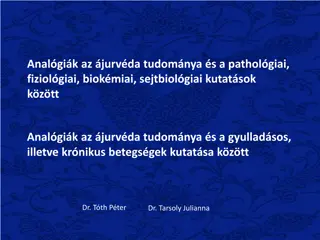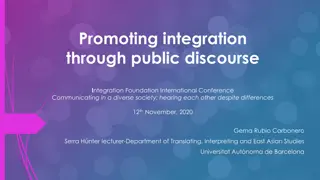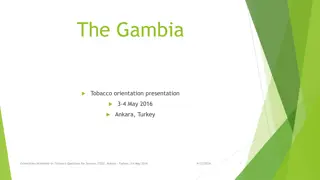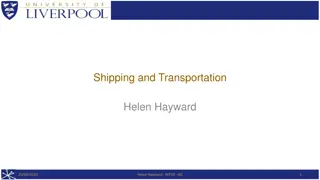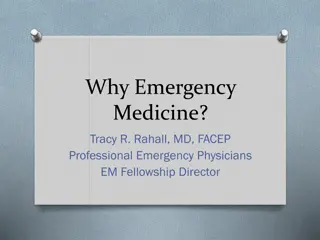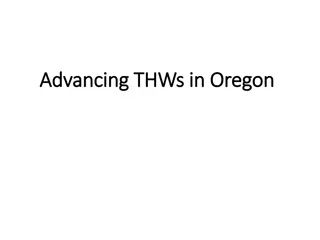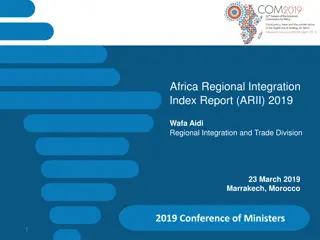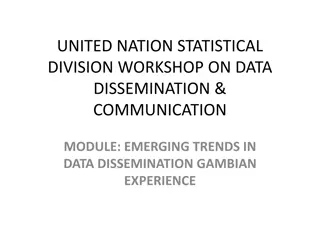Traditional Medicine Integration into Gambian Health System
The Gambia's National Traditional Medicine Program aims to integrate traditional and complementary medicine practices into the health system. Established in 2001, the program faces challenges in regulating practitioners and ensuring the safety of herbal products. Despite these hurdles, it strives to provide quality healthcare through legislation and partnerships, with a focus on integrating traditional medicine into conventional healthcare. The country's profile, history, objectives, strategies, activities, achievements, challenges, and recommendations paint a comprehensive picture of the program's development.
Download Presentation

Please find below an Image/Link to download the presentation.
The content on the website is provided AS IS for your information and personal use only. It may not be sold, licensed, or shared on other websites without obtaining consent from the author.If you encounter any issues during the download, it is possible that the publisher has removed the file from their server.
You are allowed to download the files provided on this website for personal or commercial use, subject to the condition that they are used lawfully. All files are the property of their respective owners.
The content on the website is provided AS IS for your information and personal use only. It may not be sold, licensed, or shared on other websites without obtaining consent from the author.
E N D
Presentation Transcript
THE GAMBIA NATIONAL TRADITIONAL MEDICINE PROGRAM (NTMP). Presenter: Abdoulie E. Mballow Programme Manager. National Traditional Medicine Programme Bsc Nursing, HEALER, SRN, CON, CHN & constable (GPF)
TOPIC Integration of Traditional and Complementary Medicine practices into the health systems and services on the 18/04/18
OUT LINE Country profile History and objective of the program Strategies Activities Achievements Challenges/ Bottleneck Way forward/ Recommendations
COUNTRY PROFILE Surface area 11,300sq km Population 2.0 million Life expectancy - 54 yrs for males 57 yrs for females Infant Mortality - >5 78 107/1000 life births Maternal mortality 11/1000 life births
HISTORY Situational Analysis Traditional medicine practitioners are scattered through out the country. Apart from indigenous practitioners, today the system has been invaded by all types of practitioners from the sub-region. Not much information is available on the background of some of the practitioners especially those of foreign origin. The claims of some of the sophisticated practitioners are difficult to substantiate. The market is flooded with all sorts of herbal and even enhanced herbal products, their safety cannot be supported. Traditional Healers groups and association exist in many regions in the country, but a body to regulate the practice of traditional medicine for the protection of the population does not exist. Therefore, there is no system for registration and licensing of traditional medicines practitioners in The Gambia so far, but a model act on TMP is already submitted for home review and possible enactment in to law.
ESTABLISTMENT A national traditional medicine programme was established in 2001 under the Ministry of Health and Social Welfare to coordinate the development of traditional medicine in the country. In 2002 a national technical working group was formed to guide the development of the programme policy.
MISSION STATEMENT/ OBJECTIVE To use Traditional medicine/Complimentary alternative medicine (TM/CAM) in the provision of quality health care to people living in The Gambia through legislation and establishing partnership and subsequently integrate into the conventional health system.
STRATEGIES a) Utilize traditional health practices effectively in the formal health care system. b) Sensitize Traditional Healers and encourage them to provide home base care and support community based health initiatives. c) Establish an effective and efficient control and monitoring mechanism on Traditional medicine practice in the Gambia. d) Promote joint operational research on Traditional Medicine.
ACTIVITES Management of TM/ CAM The Regulation of TM/ CAM Research Promotion and Development
MANAGEMENT OF TM/CAM Capacity building for effective and efficient Programme management Building partnership with key stakeholders Coordinate activities related to the programme for proper management of resources Mobilise resources at all levels for programme management and sustainability Regular monitoring and evaluation of programmes and activities on TMK.
The Regulation of TM/ CAM Establishment of TM/CAM Council and Board Licensing of Traditional Healers and vendors/ harvesters Registration of the traditional medicinal products Protection of intellectual property rights Control of clinical trials on TM/CAM Control traditional medicine advertisements on TV/ radios Establishment of codes of ethics and standards to ensure safety of TM/CAM.
Research Capacity building and to undertake research activities Conduct operational research to improve programme management Mobilise resources to support research Set task force in conducting a research a clinical trails
Promotion Development of TM/CAM management information system Sensitisation on TM/CAM at all levels Censorship of advertisements. Exhibitions and promotion of TM Conducts Radio sensitization on TM
Development of traditional medicine Support practitioners e.g. training Enhance collaboration of traditional medicine programme and partners Establish linkage with the conventional health system Ensure availability of medicinal plants (Botanical gardens)
TYPES OF TRADITIONAL MEDICINE PRACTICE IN THE GAMBIA 1. 2. 3. 4. 5. 6. 7. 8. 9. 10. Traditional Birth Attendants 11. Pranic/ Energy healing 12. Reike Herbalist Mara bouts Sorcerers/ Spiritualist Bone setters Definers/ fortunetellers Food therapies Massagers cupping Circumcisers
ACHIEVEMENTS/BEST PRACTICE Set a National Traditional Medicine Program under the Ministry of Health. Development and finalization of a National Policy on Traditional Medicine. Formation of a recognized National Traditional Healers Assembly (TRAHASS). Training and sensitization of traditional healers and health staffs on the program. Celebration of Traditional Medicine days (National TM day and AFRICAN TM day). Traditional medicine clinic/ dispensary Biannual work plan already developed
CHALLENGES Keeping to action plan time line very difficult. Program under funded. Limited staff to run programme activities. Many Health staff are yet to recognize traditional healers and their medicines in collaboration to conventional medicine. Training curriculum yet to be develop. So far no healer is enroll in the Health system The TMP act yet to be enacted.
INTEGRATION OF TRADITIONAL MEDICINES IN THE GAMBIA Not as yet
RECOMMENDATION. Lobby funding to run programs e.g. sensitization, supervision, training and logistics for licensing and registration of TM products. Sign a memorandum of understanding between Traditional Medicine practitioners , NGOs, Agencies and the Ministry of Health to develop TMP. Send a circular to all health facilities and programs on the advocacy for the collaboration and integration of traditional medicine practices in the Health system. Collaborate with other programs and organizations e.g. WHO, WAHO, Mental Health, IMNCI, PHC, Directorate of Health Education, Non-Communicable Diseases, AIDS control, NARI, Forestry department and other stakeholders. Enact the TMP regulation
RECOMMENDATION Enumerate all traditional healers throughout the Country and select the best of them for collaboration and integration. Hire their expertise into the health system and use them to train others on the job. To issue license to traditional healers, dealers and registration of their products and premises. Sensitized Traditional medicine practitioners on registration and licensing. Sensitization of Traditional Healers and Health staff for better collaboration and integration. The programme office should frequently monitor and supervise traditional healers and health staff for standard operation and collaboration.
THE END JAZAKUMULLAHU KHAIRAN. SALAAM. THANK YOU.
